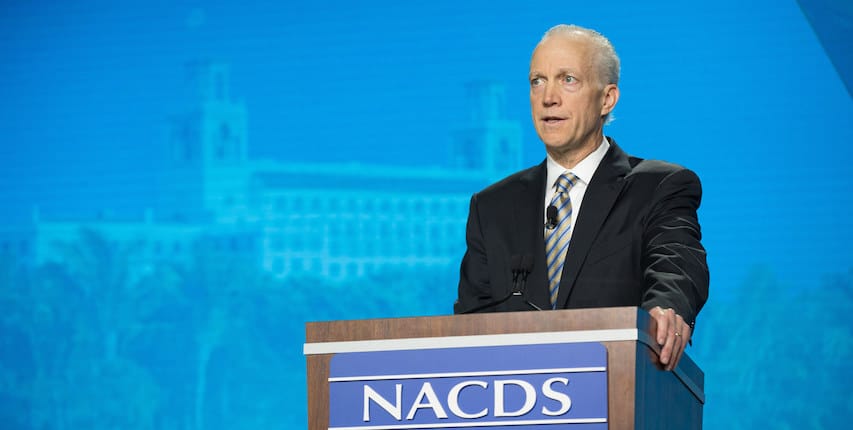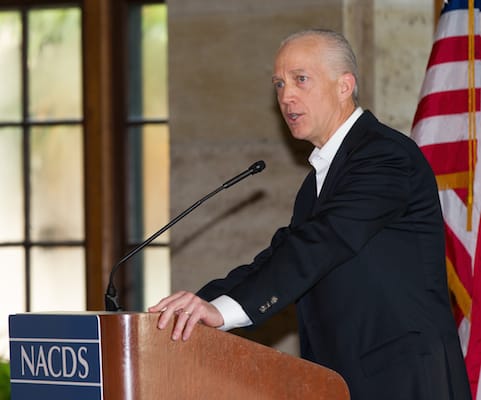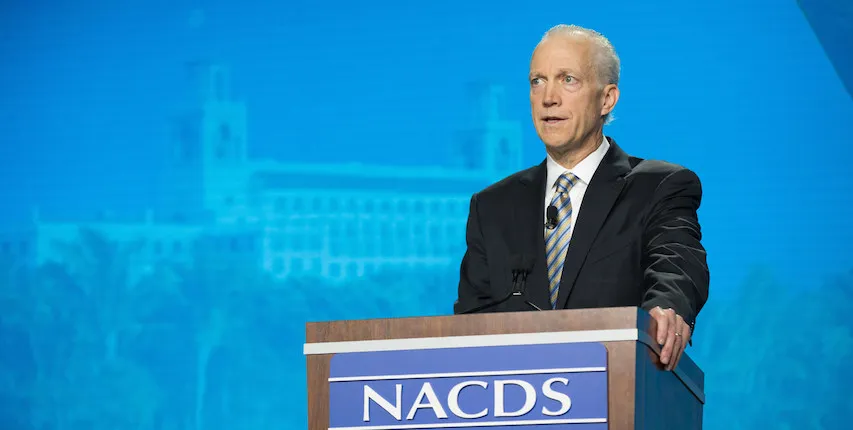
Martin Otto on NACDS: “As an association, we need to follow the same principles that hold true in retail.”
SAN ANTONIO — Even the best-run, most effective organizations can benefit from occasionally reconsidering their work in a new light.
The National Association of Chain Drug Stores is a case in point. Long viewed as the country’s preeminent retail trade group, NACDS has in recent months broadened and deepened its already formidable commitment to the pharmacy profession, which stands at the heart of the industry; the millions of patients and customers served by its members every day; and public health in communities across the U.S.
Martin Otto was the catalyst for that process. During his yearlong term as NACDS chairman, the H-E-B executive, whom NACDS president and chief executive officer Steve Anderson has often referred to as the trade group’s “challenger in chief,” encouraged his colleagues to view community pharmacy in the context of health care as a whole, and to step up their level of engagement with the full range of issues that affect the well-being of Americans.
For his success in reframing the challenges facing the industry and bringing a new perspective to pharmacy’s role in society, the editors of Chain Drug Review have given Otto the publication’s Industry Leadership Award.
“I don’t think it’s very valuable when organizations that have responsibility and influence approach things in a parochial way and don’t look at the broader implications of their actions,” says Otto, who served as H-E-B’s chief merchant and chief financial officer at the time he was NACDS chairman, and has since been promoted to chief operating officer at the food/drug combination store chain.

“At our company, we look at issues in an end-to-end, customer- and employee-focused way. It’s important that any trade association or political organization look at the entire context and desired outcome, and not just approach things from a narrow set of interests, which unfortunately is how health care, for the most part, continues to be approached. Starting with the principle of attacking the underlying issues, not just symptoms, is where I like to operate from in solving problems. I approached the NACDS chairmanship the same way.”
Otto’s determination to look at the big picture didn’t stop him from understanding and prioritizing specific issues — winning provider status, securing changes in direct and indirect remuneration policies, and protecting the Tricare program, among them — that have a direct bearing on the future of pharmacy. But, he insisted, those challenges shouldn’t be viewed in isolation.
“Clearly having NACDS lobby for what the industry needs from legislators and regulators is really, really important,” Otto notes. “Those topics have to be addressed, and they all matter, but every one of them ought to be considered in the context of what it does for the broader picture of health care, our economy and our country.
“As an association, we need to follow the same principles that hold true in retail. We have responsibilities as retailers to do the right things for a broad set of stakeholders, not just the shareholders, but also our communities and our customers and our employees and our suppliers. Everybody counts, and everybody ought to be considered when decisions are made. It’s a matter of fairness and, secondly, I think it’s a matter of having a point of view that considers the long term. I think that’s really important.”
Intense study of the pharmacy business and its relation to American society led to Otto’s expansive view of NACDS’ mission.
“It’s important for business leaders, elected officials and regulators to analyze and distill the complex issues we face today — health care, education, the deficit, energy policy, immigration and others — into their essential elements, and then communicate them clearly,” he says. “Doing that would give us the foundation to debate the various potential outcomes. That’s a real missing piece for health care and the other important issues we face as a nation.”
As NACDS chairman, Otto performed that function in a series of meticulously researched presentations at the Annual Meeting, Total Store Expo and other venues.
“Everyone involved with the association knows the business very well,” he explains, “but I thought it would be helpful to lay out the entire landscape. It was my intent to help educate others about the challenges we face by analyzing the different parts of the picture and then looking at it as a whole.”

Otto: “We, as a nation, must address the economics of health care.”
The image that emerged from the wealth of data assembled by Otto was troubling on many levels. The U.S. spends far more on health care than any other nation — $3.3 trillion, or 17.9% of gross domestic product, according to an analysis released last month by the Centers for Medicare and Medicaid Services.
As Otto points out, the share of GDP here contrasts with levels of 8% to 12% in other industrialized countries. Even more distressing, the return Americans are getting on their investment, as gauged by such measures as life expectancy, infant mortality and prevalence of chronic diseases, lags well behind that in other advanced nations.
“Americans are spending a lot of money on health care, and we have to ask ourselves whether we are getting our money’s worth. The answer is no,” Otto said during a presentation at NACDS Total Store Expo in San Diego last August. That is a devastating failure, he went on, not only negatively impacting the health and well-being of citizens, but gutting funding for other important programs, including education, social services and investment in infrastructure.
“We, as a nation, must address the economics of heath care; it really is the linchpin for everything else,” notes Otto. “For us to have the nation I think we all aspire to means we can’t tolerate poverty at the level we have today.
We’re likely to end up with a lot of citizens who won’t feel like they’re part of the team. And we’re likely to end up with an undereducated workforce. Education must be adequately funded or we’ll stunt future economic growth. The current situation is not sustainable.”
“That begs the question, ‘What are the solutions?’ I think it starts with an analysis of why we’re paying a third more of our GDP than other industrialized countries for health care. When you look at the frequency and cost of tests and procedures, as well as the costs associated with unhealthy lifestyles, compared with other nations, you quickly see where things diverge.
“If we can develop ways to reduce health care spending from 18% of GDP, and bring it in line with the 10% or 12% in other western countries, while at the same time improving outcomes, we can free up a lot of resources to improve access to health care and address education and poverty. Our current situation puts our country at a meaningful disadvantage.”
Otto expresses confidence that NACDS and its member companies have the wherewithal to grasp the problems that beset the U.S. health care system and help craft practical solutions — collectively on the public policy front, and as individual entities working in the private sector.
“Steve Anderson and the NACDS team do a great job focusing on the key issues, and they are dedicated to serving the membership and the industry,” he says. “It’s a professionally run organization with talented leadership and staff. Everyone there is really good at what they do.”
The association’s strengths, together with the newfound expansiveness in outlook fostered by Otto will be a significant source of strength as the pharmacy profession strives to take on greater responsibility for the delivery of health care.
“Our tasks are articulating pharmacy’s role in the broader context of health care and articulating health care’s role in the broader context of our entire society,” explains Otto.
NACDS will have to deploy the full range of its considerable political skills in advancing the industry’s cause and enhancing its impact. For community pharmacy to achieve the goal of establishing itself as, in the association’s formulation, the face of neighborhood health care, which patients recognize as the first option for immunizations, diagnostic testing and other routine services, it will require coalition building with other health care groups and effective advocacy for further changes in public policy.
“It’s not something that’s going to happen overnight, because it’s going to require shared sacrifice,” Otto says, “and even if it’s shared, it doesn’t feel very good. Everybody has a job to represent their own industry’s interest and then try to find common ground based on where the facts take us, so it will be a long process.”
Otto, who remains an active member of the NACDS board, will help advance the cause when he participates in the World Health Care Congress, which is scheduled for April 29 to May 2 in Washington, D.C. He will participate in a panel discussion with other health care stakeholders, as well as joining Brooke Brownlow, vice president of benefits, compensation and human resources technology at H-E-B, to talk about some of the things the company is doing, including the operation of two closed-door clinics, to help employees stay healthy in the most cost-effective manner possible.
“There are three outcomes that I think we’re all after — improved quality of care, cost and access,” Otto notes. “I’m hoping the panel turns into a discussion of how we can tackle the challenges and find solutions to make those goals a reality.”
“I’d like us to have a good discussion that helps create some momentum. We’re not going to create a solution in one meeting, but hopefully the discussion contributes to the process by causing people in the audience to think more about what needs to be done.”
If Otto’s success at opening up new horizons and stimulating fresh ideas among the NACDS membership is any indication, he is likely to accomplish the goal he has set for himself.







